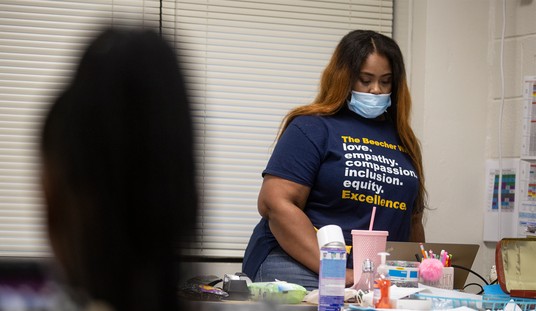Just how far can state governments go in limiting liberty in an emergency? Far enough to make Texas’ order limiting health-care options to essentials constitutional, the Fifth Circuit ruled last night, reinstating the order that blocks almost all abortions in the state. Texas arguably had a legitimate and urgent state interest in rationing surgical supplies for use to fight the pandemic, the 2-1 decision declared, and the lower court erred in not considering the evidence ahead of the constitutional argument:
Texas can continue to legally implement its near-total ban on abortion services amid the coronavirus outbreak, the Fifth Circuit Court of Appeals ruled Tuesday afternoon. Abortion services in Texas have been unavailable for more than two weeks, driving some patients to seek the procedure in neighboring states or terminate their pregnancy themselves.
Per guidance from Texas Attorney General Ken Paxton, any abortion “not medically necessary to preserve the life or health” of the patient must be halted as part of the state’s directive suspending “non-essential” medical procedures amid the coronavirus pandemic. Doctors who violate the order face “penalties of up to $1,000 or 180 days of jail time.”
In a split ruling Tuesday, two federal judges — Judge Kyle Duncan and Judge Jennifer Walker Elrod — ruled the directive was constitutional, despite Supreme Court precedent that protects access to abortion. In their 47-page decision, they wrote that “the ‘drastic and extraordinary’ remedy of mandamus is warranted.”
“The bottom line is this: when faced with a society-threatening epidemic, a state may implement emergency measures that curtail constitutional rights so long as the measures have at least some “real or substantial relation” to the public health crisis,” Judge Duncan and Judge Elrod wrote.
At issue, Duncan and Elrod write, is the kind of emergency authority allowed by the Supreme Court under the 1905 decision in Jacobson v. Commonwealth of Massachusetts. It’s not enough to declare a constitutional right as overriding emergency decisions, the court ruled 115 years ago, but to determine that the state overstepped emergency powers to limit access to constitutional rights by using the least intrusive restriction necessary to satisfy a legitimate emergency state interest:
First, the district court ignored the framework governing emergency public health measures like GA-09. See Jacobson v. Commonwealth of Massachusetts, 197 U.S. 11 (1905). “[U]nder the pressure of great dangers,” constitutional rights may be reasonably restricted “as the safety of the general public may demand.” Id. at 29. That settled rule allows the state to restrict, for example, one’s right to peaceably assemble, to publicly worship, to travel, and even to leave one’s home. The right to abortion is no exception.
The shelter-in-place orders issued in this emergency violate a number of normally constitutional rights, including the ones listed above. We accept this as a temporary measure because of the exigent circumstances of the emergency and the application of these restrictions in dealing with it. In a pandemic, we need to keep people separated as much as possible, and so churches are being shut down even though the right to freely express religious beliefs in public is among the first explicit rights protected in the Constitution.
The district court should have used Jacobson to test whether the restriction on abortion would pass a strict scrutiny test that it was the least intrusive measure on which to serve the state’s interest in preserving masks, gowns, and other personal protective equipment (PPE) for health care workers dealing with the pandemic. The court, however, appears ready to recognize that abortion clinics compete for those rare resources:
For example, the district court did not consider whether different methods of abortion may consume PPE differently. Our own review of the record, at this preliminary stage, reveals considerable evidence that surgical abortions consume PPE.23 By contrast, the record is unclear how PPE is consumed in medication abortions.24 Nor did the district court consider whether Respondents could prove that GA-09 infringes abortion rights in specific contexts. For example, in their stay opposition, Respondents argue that GA-09 cannot apply to “patients whose pregnancies will, before the expiration of the stay, reach or exceed twenty-two weeks LMP [“last menstrual period”], the gestational point at which abortion may no longer be provided in Texas.” ECF 30 at 21 (brackets added). As Petitioners point out, if competent evidence shows that a woman is in that position, nothing prevents her from seeking as-applied relief.
The appellate court seems open to entertaining an argument that some procedures could get performed, primarily chemically induced abortions, but anything requiring PPE would fall under Texas’ emergency ban. However, that’s what the district court refused to consider, ruling instead that the decree simply violated a constitutional right to access abortion.
Needless to say, we haven’t heard the last of this. Planned Parenthood announced plans to appeal, declaring that they “won’t let this injustice stand”:
Alexis McGill Johnson, acting president and CEO of Planned Parenthood, called the decision “unconscionable.”
“Abortion is essential, it’s time-sensitive, and it cannot wait for a pandemic to pass,” she said in a statement. “Instead of playing politics during a pandemic, Gov. Abbott should be focusing on the health care needs of his constituents. Planned Parenthood won’t let this injustice stand.” …
An appeal is expected possibly as soon as Wednesday after a federal appeals court panel upheld the restriction on Tuesday. The fight comes as other states, including Ohio, Oklahoma and Alabama, are stepping up efforts to limit abortion access during the public health crisis.
Other courts have rolled back some of those emergency restrictions, so the Supreme Court won’t have much choice but to take this issue up, and quickly. They will undoubtedly limit their review to the issue of emergency orders and rational state interest in preserving medical resources, but it will also likely end up in a 5-4 split anyway. It shouldn’t, given the restrictions on other forms of medical care in place — even most dentistry has been postponed in some states, including Minnesota. It shouldn’t in light of Jacobson, either. But … we all know it will.








Join the conversation as a VIP Member